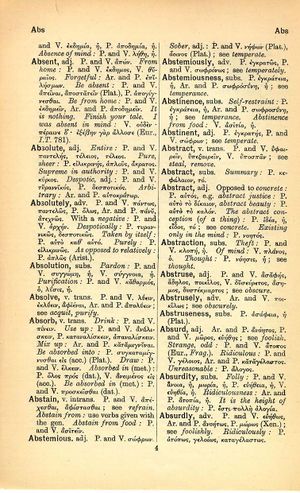absolute: Difference between revisions
mNo edit summary |
(1) |
||
| Line 21: | Line 21: | ||
{{Georges | {{Georges | ||
|georg=absolūtē, Adv. m. Compar. (Plin. ep. 4, 27, 2) u. Superl. (Cornif. rhet. 2, 28) ([[absolutus]]), I) in [[sich]] [[abgeschlossen]], [[vollständig]], [[vollkommen]], Cic. u.a.: vivere, vollk. (= [[sittlich]] [[rein]]), Cic.: [[abs]]. [[doctus]] (Ggstz. [[mediocriter]] [[doctus]]), Suet. – II) [[ohne]] [[Zusatz]], [[geradezu]], [[schlechthin]], [[inscriptum]] [[esse]], Plin.: respondere, [[unbedingt]], [[absolut]], [[kategorisch]], ICt.: dicere, [[ohne]] Umschweife, [[unumwunden]], Amm. u. [[Auson]]. – [[als]] gramm. t.t., [[ohne]] [[Kasus]], [[absolut]], proferre verba transitiva, Prisc.: [[multa]] verba [[absolute]] [[sine]] coniunctione [[casus]] alicuius solent proferri, Prisc. | |georg=absolūtē, Adv. m. Compar. (Plin. ep. 4, 27, 2) u. Superl. (Cornif. rhet. 2, 28) ([[absolutus]]), I) in [[sich]] [[abgeschlossen]], [[vollständig]], [[vollkommen]], Cic. u.a.: vivere, vollk. (= [[sittlich]] [[rein]]), Cic.: [[abs]]. [[doctus]] (Ggstz. [[mediocriter]] [[doctus]]), Suet. – II) [[ohne]] [[Zusatz]], [[geradezu]], [[schlechthin]], [[inscriptum]] [[esse]], Plin.: respondere, [[unbedingt]], [[absolut]], [[kategorisch]], ICt.: dicere, [[ohne]] Umschweife, [[unumwunden]], Amm. u. [[Auson]]. – [[als]] gramm. t.t., [[ohne]] [[Kasus]], [[absolut]], proferre verba transitiva, Prisc.: [[multa]] verba [[absolute]] [[sine]] coniunctione [[casus]] alicuius solent proferri, Prisc. | ||
}} | |||
{{LaEn | |||
|lnetxt=absolute absolutius, absolutissime ADV :: completely, absolutely; perfectly; without qualification, simply, unreservedly | |||
}} | }} | ||
Revision as of 22:25, 27 February 2019
English > Greek (Woodhouse)
adj.
entire: P. and V. παντελής, τέλειος, τέλεος.
pure, sheer: P. εἰλικρινής, ἁπλοῦς, ἄκρατος.
supreme in authority: P. and V. κύριος.
despotic, adj.: P. and V. τυραννικός, P. δεσποτικός.
arbitrary: Ar. and P. αὐτοκράτωρ.
Latin > English (Lewis & Short)
absŏlūtē: adv., v. absolvo, P. a.
Latin > French (Gaffiot 2016)
absŏlūtē,¹⁵ d’une façon achevée, parfaite : Cic. Ac. 2, 55 ; Tusc. 4, 38 ; Or. 227 ; absolutius Plin. Min. Ep. 4, 27, 2 ; absolutissime Her. 2, 28 || d’une façon générale : Tert. Or. 21, etc. || [gramm.] absolument : Prisc. ; Don. Andr. 817 ; Eun. 459 ; Ad. 49 ; Phorm. 52.
Latin > German (Georges)
absolūtē, Adv. m. Compar. (Plin. ep. 4, 27, 2) u. Superl. (Cornif. rhet. 2, 28) (absolutus), I) in sich abgeschlossen, vollständig, vollkommen, Cic. u.a.: vivere, vollk. (= sittlich rein), Cic.: abs. doctus (Ggstz. mediocriter doctus), Suet. – II) ohne Zusatz, geradezu, schlechthin, inscriptum esse, Plin.: respondere, unbedingt, absolut, kategorisch, ICt.: dicere, ohne Umschweife, unumwunden, Amm. u. Auson. – als gramm. t.t., ohne Kasus, absolut, proferre verba transitiva, Prisc.: multa verba absolute sine coniunctione casus alicuius solent proferri, Prisc.
Latin > English
absolute absolutius, absolutissime ADV :: completely, absolutely; perfectly; without qualification, simply, unreservedly

